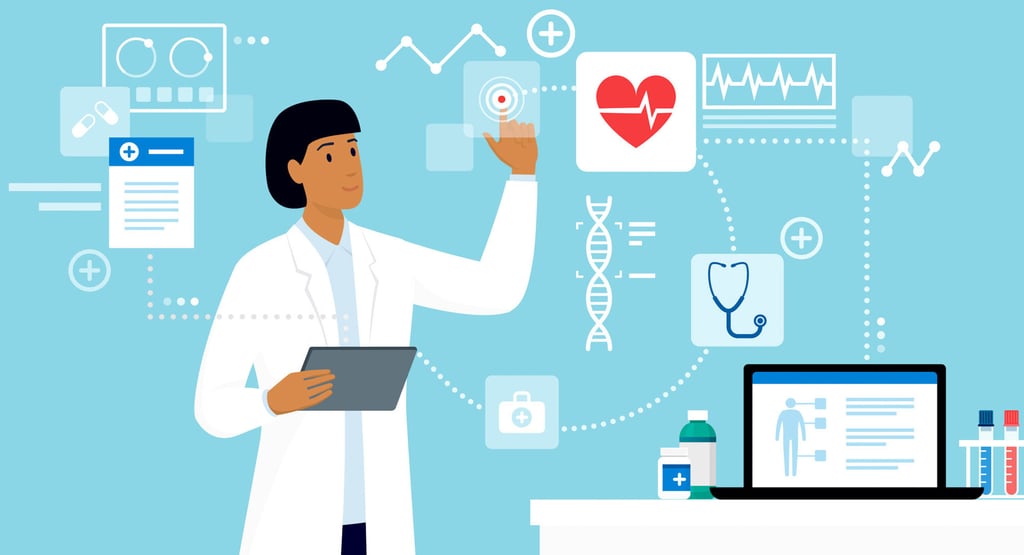The Future of Data Analytics in Healthcare
HEALTHCARE


In an era of digital transformation, the healthcare industry stands at the precipice of a revolution driven by data analytics. The fusion of healthcare and cutting-edge data analytics technologies promises not only to transform patient care but also to enhance the efficiency and effectiveness of healthcare systems worldwide. In this exploration, we delve into the profound impact of data analytics on healthcare and glimpse into the future where data-driven insights hold the key to healthier lives.
The Current Landscape
Before we journey into the future, it's essential to grasp the current state of data analytics in healthcare. Healthcare generates vast amounts of data daily, from electronic health records (EHRs) and medical imaging to wearable device metrics and genomic information. However, harnessing the full potential of this data has been a challenge.
The Key Pillars of Data Analytics in Healthcare
The future of data analytics in healthcare rests on four crucial pillars:
Predictive Analytics: Predictive models use historical and real-time data to forecast future health events. For instance, predicting disease outbreaks, identifying high-risk patients, and optimizing treatment plans.
Prescriptive Analytics: This goes a step beyond prediction, providing recommendations for actions. In healthcare, prescriptive analytics can suggest the most effective treatment options for individual patients.
Descriptive Analytics: Descriptive analytics focuses on summarizing historical data to provide insights into past events and trends. It's instrumental in understanding patient demographics, disease patterns, and resource allocation.
Diagnostic Analytics: Diagnostic analytics leverages data to identify the root causes of issues. It's crucial for early disease detection, where algorithms can sift through extensive patient data to identify potential health risks.
The Future Unveiled
Now, let's explore how these pillars will shape the future of healthcare:
1. Personalized Medicine
One of the most exciting prospects is personalized medicine. With advancements in genomics and data analytics, treatments can be tailored to an individual's genetic makeup and lifestyle. This ensures maximum efficacy with minimal side effects.
For example, a patient with a specific genetic predisposition to a disease might receive a personalized treatment plan that's more effective than a standard approach.
2. Disease Prevention and Early Detection
Data analytics will play a pivotal role in disease prevention and early detection. Wearable devices and health apps continuously monitor vital signs and can alert users and healthcare providers to potential health issues.
Moreover, predictive analytics can identify high-risk individuals, allowing for targeted interventions before a condition escalates. This not only saves lives but also reduces healthcare costs.
3. Healthcare Efficiency
Efficiency gains will be significant in the healthcare sector. Predictive maintenance can ensure that medical equipment is serviced before failure, reducing downtime and improving patient care.
Additionally, analytics can optimize hospital resource allocation. For instance, it can predict patient admissions, allowing hospitals to allocate staff and resources accordingly, ensuring better patient care and cost-effectiveness.
4. Drug Discovery and Development
Data analytics will accelerate drug discovery by analyzing vast datasets to identify potential drug candidates and predict their effectiveness. This not only reduces the time and cost of drug development but also leads to the discovery of more targeted therapies.
5. Telemedicine and Remote Monitoring
Telemedicine, powered by data analytics, will become increasingly prevalent. Patients can consult with healthcare professionals remotely, and wearable devices will provide real-time health data for monitoring. This improves access to care, particularly in remote or underserved areas.
Challenges and Considerations
The future of data analytics in healthcare isn't without challenges:
Data Privacy: Healthcare data is highly sensitive. Striking a balance between data access for analytics and patient privacy is crucial.
Interoperability: Healthcare data is often siloed in different systems. Achieving interoperability to enable comprehensive analytics remains a challenge.
Ethical Use: Ensuring that data analytics are used ethically and do not result in bias or discrimination is paramount.
Regulatory Compliance: Compliance with healthcare regulations like HIPAA is essential to protect patient data.
Conclusion
The future of data analytics in healthcare is incredibly promising. It holds the potential to revolutionize patient care, disease prevention, and healthcare efficiency. Personalized medicine, early disease detection, and optimized resource allocation are just a few of the profound impacts we can expect.
However, realizing this potential requires addressing challenges like data privacy, interoperability, ethics, and regulatory compliance. As healthcare systems worldwide increasingly embrace data analytics, the future of healthcare is brighter than ever, offering hope for healthier lives and more effective healthcare delivery.
